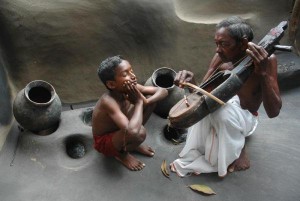Hindol Deb – Swar Ganga Music Foundation

http://www.myspace.com/hindoldeb
The origins of Indian classical music can be found in the oldest of scriptures, part of the Hindu tradition, the Vedas. It has also been significantly influenced by Indian folk music, and Hindustani music has been influenced by Persian music. The Samaveda, one of the four Vedas, describes music at length. The Samaveda was created out of Rigveda so that its hymns could be sung as Samagana; this style evolved into jatis and eventually into ragas. Indian classical music has its origins as a meditation tool for attaining self realization. Bharat’s Natyashastra was the first treatise laying down fundamental principles of dance, music and drama. Read More: > HERE <
One of the upcoming sitar player and composer of his generation, Hindol started learning the Sitar at the age of five from his father, Sri. Panchanan Sardar. Later, he was groomed under the guidance of Pt. Deepak Choudhury, a senior disciple of Pt. Ravi Shankar. He graduated from the Prayag Sangeet Samiti under Allahabad University with a gold medal and is a recipient of the Sahitya Kala Parishad scholarship and the National Scholarship for Hindustani Classical Music in Sitar.
Hindol has been pursuing his dream intensely and is on his way to establish himself as a talented, upcoming young musician, giving several performances at many festivals in India and abroad. He has composed and played his music for various plays and ballets.
One striking quality about Hindol is the sense of maturity in his performance, which is unique at his age. With the deep resonating tone of his instrument, each note makes its presence felt and nothing fades away in ambiguity. His aesthetical understanding is rooted deep in spirituality. Simultaneously, he has also accomplished himself as a composer, exploring the infinite combinations in the crossover of Indian music with various other genres like Western Classical, Jazz, Blues, Electronica, Flamenco and folk music.
Recently, he was invited by the French government, with a residency scholarship, to work with other musicians and experiment with different genres like Jazz, Blues and electronic music, along with Indian classical music and performances. He was also invited by the Swedish government as the representative of India, with the musicians from fourteen different countries, to teach and play each other’s music and to perform at the ETHNO festival in Sweden. He has also toured Belgium and Greece to take part in many concert festivals.
Apart from being a performer, he is also a dedicated teacher and conducts workshops of Hindustani music, improvisation techniques and Indian Classical music appreciation in India and abroad.
Shri. Hindol Deb Plays Raag Hemant on the Day 1 of SwarGanga Music Festival 2008. The festival spanned for two days 20th and 21st December 2008. For more information visit www.swarganga.org.
SwarGanga Music Foundation, Atlanta, GA and SwarGanga Trust, Thane, India are non-profit organizations started by Adwait Joshi to promote young and upcoming artists in the field of North Indian Classical Music and spread the knowledge of North Indian Classical Music to people all over the world. SwarGanga currently has over 2 million hits from 147 different countries every year. Thanks to you all for making this site so popular.here.events page or to see any classical music events upcoming in your area please visit the event calendar.
To learn about different concepts of classical music such as sur, patti, taal, raags, please go through the series of articles starting . For a list of events organized by SwarGanga please visit www.swarganga.org . Your feedback helps us improve the website. So please respond by sending us an email .
The Energy [R]evolution demonstrates how the world can get from where we are now, to where we need to be in terms of phasing out fossil fuels, cutting CO2 while ensuring energy security. This includes illustrating how the world’s carbon emissions from the energy and transport sectors alone can peak by 2015 and be cut by over 80 percent by 2050. This phase-out of fossil fuels offers substantial other benefits such as independence from world market fossil fuel prices as well as the creation of millions of new green jobs. http://www.greenpeace.org/energyrevolution
Comments are closed.